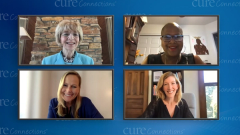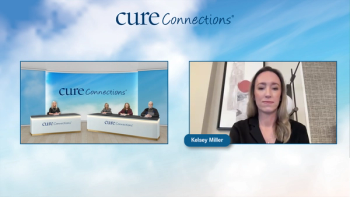
Importance of Support Groups in Metastatic Breast Cancer
Lisa Laudico provides insight into the value of support groups in metastatic breast cancer.
Episodes in this series

These are the experiences and opinions of panelists, not physicians.
Shirley A. Mertz, MA, JD: Lisa, you have had a significant impact in an organization called Share Cancer Support as a support group volunteer. I'm telling about you because I'm so proud of what you do. Can you share with our listeners why it is important for metastatic breast cancer patients to connect with a community of people who are on a similar journey with them, and what are the benefits?
Lisa Laudico: Well, innumerable I think is what I would say. I'm part of my own personal support group for my cancer center and that support group has been, I just don't think I can put into words actually how they've been supportive of me and have become amongst my dearest friends. I will say that in support groups you're not always going to, this happens, and I think it has to be said, that there are people I know that have tried a number of different support groups before they hit the one that was so right, that was right for them. And as a clinical social worker myself, in my past life I, you have to create groupings as best you can so that the forming and the storming of the groups are supportive to the people and the goals that you want for that particular group, right? I'm part of a young women's support group at my cancer center and there's also, I don't know what the right word, that they're very much post-menopausal group.
Shirley A. Mertz, MA, JD: The older people.
Lisa Laudico: I don't want to say that Shirley. You know what I mean, and so there's the.
Shirley A. Mertz, MA, JD: I'm better alive than not, so go ahead.
Lisa Laudico: Really post-menopausal. Really post. Anyway, I'm post-menopausal now too, like all of us are post-menopausal. But anyway, I think that the importance is with a support group is try it out. I would really encourage anyone who has an mBC diagnosis to not give up. There are some really wonderful silver linings from Covid in that the offerings of online support groups by organizations like Share and LPPC and others are fantastic, and you can find more that maybe fit your exact needs. I have friends who are part of BIPOC support groups, which I think is really important. Black and other people of color so that those experiences are important to be supported and talked about in a safe space. That's important. Also, I have friends who are very active in LGBTQ2S+ support groups, also super important. We talk about all of these issues on the podcast for example, but a podcast is one-way into your ear, and I think a support group is wonderful because it's interactive. Even if it's over Zoom, we're sharing our personal experience and a friend, another support group member, is going to reflect on that. And then that growth and healing from that is just, it goes beyond words. And again, I just encourage everyone to keep trying in finding the right support group because there's a chemistry thing, right? There's always some chemistry involved and that's OK.
Shirley A. Mertz, MA, JD: And if I could tell a quick story to illustrate the importance of finding the right support group. There were two ladies who lived in New York in 2003 who were metastatic breast cancer patients and they decided to go to one of the premier hospital support groups in New York City. It was a breast cancer support group, they went there, they were all in a round circle, they told their stories, and then the ladies got a call the next day from the social worker who in the group. And she says, I was told to all and tell you that the people in the support group who were early-stage breast cancer patients.
Lisa Laudico: That's an important point.
Shirley A. Mertz, MA, JD: Did not want them to come back because they said your stories, of these two ladies, your stories are downers. We don't want to hear this. What they did, is they went founding the Metastatic Breast Cancer Network, which I'm part of it, but it's very important. In a way, it's very sad because we're all technically in this together. But I think when you have an early diagnosis you really don't want to hear about crossing over the river to the other stage of the disease. And what you pointed out, Lisa, is really good. That when you are with people who are like minded, have like concerns, that strength, sustenance, and you can really move forward.
This transcript has been edited for clarity.




